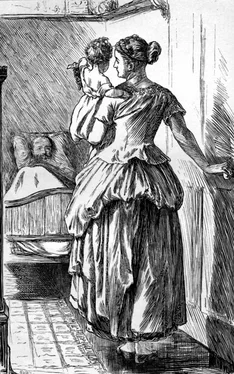"Not I," said he, reddening. "It would seem now as if I only wanted her for a housekeeper. Besides, she avoids me at every turn, and will not even look at me. I am sure she bears me some ill-will about that ne'er-do-well."
There was silence between us for some time, which he at length broke.
"The pastor has a good and comely daughter. Her mother is a famous housewife. They often have asked me to come to the parsonage and smoke a pipe. When the vintage is over, and I am less busy, I think I will go there, and look about me."
"When is the vintage?" asked I. "I hope it will take place soon, for I am growing so well and strong I fear I must leave you shortly; but I should like to see the vintage first."
"Oh, never fear! you must not travel yet awhile; and Government has fixed the grape-gathering to begin on the fourteenth."
"What a paternal Government! How does it know when the grapes will be ripe? Why cannot every man fix his own time for gathering his own grapes?"
"That has never been our way in Germany. There are people employed by the Government to examine the vines, and report when the grapes are ripe. It is necessary to make laws about it; for, as you must have seen, there is nothing but the fear of the law to protect our vineyards and fruit-trees; there are no enclosures along the Berg-Strasse, as you tell me you have in England; but, as people are only allowed to go into the vineyards on stated days, no one, under pretence of gathering his own produce, can stray into his neighbour's grounds and help himself, without some of the duke's foresters seeing him."
"Well," said I, "to each country its own laws."
I think it was on that very evening that Thekla came in for something. She stopped arranging the tablecloth and the flowers, as if she had something to say, yet did not know how to begin. At length I found that her sore, hot heart, wanted some sympathy; her hand was against every one's, and she fancied every one had turned against her. She looked up at me, and said, a little abruptly,—
"Does the gentleman know that I go on the fifteenth?"
"So soon?" said I, with surprise. "I thought you were to remain here till All Saints' Day."
"So I should have done—so I must have done—if the Fräulein had not kindly given me leave to accept of a place—a very good place too—of housekeeper to a widow lady at Frankfort. It is just the sort of situation I have always wished for. I expect I shall be so happy and comfortable there."
"Methinks the lady doth profess too much," came into my mind. I saw she expected me to doubt the probability of her happiness, and was in a defiant mood.
"Of course," said I, "you would hardly have wished to leave Heppenheim if you had been happy here; and every new place always promises fair, whatever its performance may be. But wherever you go, remember you have always a friend in me."
"Yes," she replied, "I think you are to be trusted. Though, from my experience, I should say that of very few men."
"You have been unfortunate," I answered; "many men would say the same of women."
She thought a moment, and then said, in a changed tone of voice, "The Fräulein here has been much more friendly and helpful of these late days than her brother; yet I have served him faithfully, and have cared for his little Max as though he were my own brother. But this morning he spoke to me for the first time for many days, — he met me in the passage, and, suddenly stopping, he said he was glad I had met with so comfortable a place, and that I was at full liberty to go whenever I liked: and then he went quickly on, never waiting for my answer."
"And what was wrong in that? It seems to me he was trying to make you feel entirely at your ease, to do as you thought best, without regard to his own interests."
"Perhaps so. It is silly, I know," she continued, turning full on me her grave, innocent eyes; "but one's vanity suffers a little when every one is so willing to part with one."
"Thekla! I owe you a great debt—let me speak to you openly. I know that your master wanted to marry you, and that you refused him. Do not deceive yourself. You are sorry for that refusal now?"
She kept her serious look fixed upon me; but her face and throat reddened all over.
"No," said she, at length; "I am not sorry. What can you think I am made of; having loved one man ever since I was a little child until a fortnight ago, and now just as ready to love another? I know you do not rightly consider what you say, or I should take it as an insult."
"You loved an ideal man; he disappointed you, and you clung to your remembrance of him. He came, and the reality dispelled all illusions."
"I do not understand philosophy," said she. "I only know that I think that Herr Müller had lost all respect for me from what his sister had told him; and I know that I am going away; and I trust I shall be happier in Frankfort than I have been here of late days." So saying, she left the room.
I was wakened up on the morning of the fourteenth by the merry ringing of church bells, and the perpetual firing and popping off of guns and pistols. But all this was over by the time I was up and dressed, and seated at breakfast in my partitioned room. It was a perfect October day; the dew not yet off the blades of grass, glistening on the delicate gossamer webs, which stretched from flower to flower in the garden, lying in the morning shadow of the house. But beyond the garden, on the sunny hill-side, men, women, and children were clambering up the vineyards like ants, — busy, irregular in movement, clustering together, spreading wide apart, — I could hear the shrill merry voices as I sat, — and all along the valley, as far as I could see, it was much the same; for every one filled his house for the day of the vintage, that great annual festival. Lottchen, who had brought in my breakfast, was all in her Sunday best, having risen early to get her work done and go abroad to gather grapes. Bright colours seemed to abound; I could see dots of scarlet, and crimson, and orange through the fading leaves; it was not a day to languish in the house; and I was on the point of going out by myself, when Herr Müller came in to offer me his sturdy arm, and help me in walking to the vineyard. We crept through the garden scented with late flowers and sunny fruit, — we passed through the gate I had so often gazed at from the easy-chair, and were in the busy vineyard; great baskets lay on the grass already piled nearly full of purple and yellow grapes. The wine made from these was far from pleasant to my taste; for the best Rhine wine is made from a smaller grape, growing in closer, harder clusters; but the larger and less profitable grape is by far the most picturesque in its mode of growth, and far the best to eat into the bargain. Wherever we trod, it was on fragrant, crushed vine-leaves; every one we saw had his hands and face stained with the purple juice. Presently I sat down on a sunny bit of grass, and my host left me to go farther afield, to look after the more distant vineyards. I watched his progress. After he left me, he took off coat and waistcoat, displaying his snowy shirt and gaily-worked braces; and presently he was as busy as any one. I looked down on the village; the gray and orange and crimson roofs lay glowing in the noonday sun. I could see down into the streets; but they were all empty—even the old people came toiling up the hill-side to share in the general festivity. Lottchen had brought up cold dinners for a regiment of men; every one came and helped himself. Thekla was there, leading the little Karoline, and helping the toddling steps of Max; but she kept aloof from me; for I knew, or suspected, or had probed too much. She alone looked sad and grave, and spoke so little, even to her friends, that it was evident to see that she was trying to wean herself finally from the place. But I could see that she had lost her short, defiant manner. What she did say was kindly and gently spoken. The Fräulein came out late in the morning, dressed, I suppose, in the latest Worms fashion—quite different to anything I had ever seen before. She came up to me, and talked very graciously to me for some time.
Читать дальше












